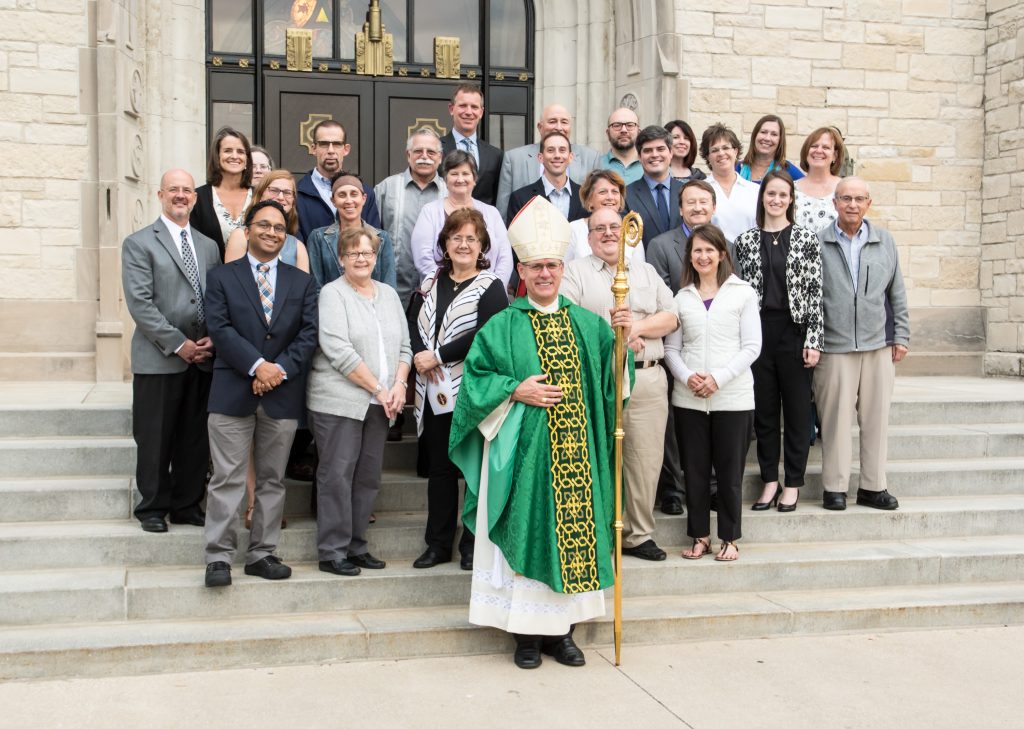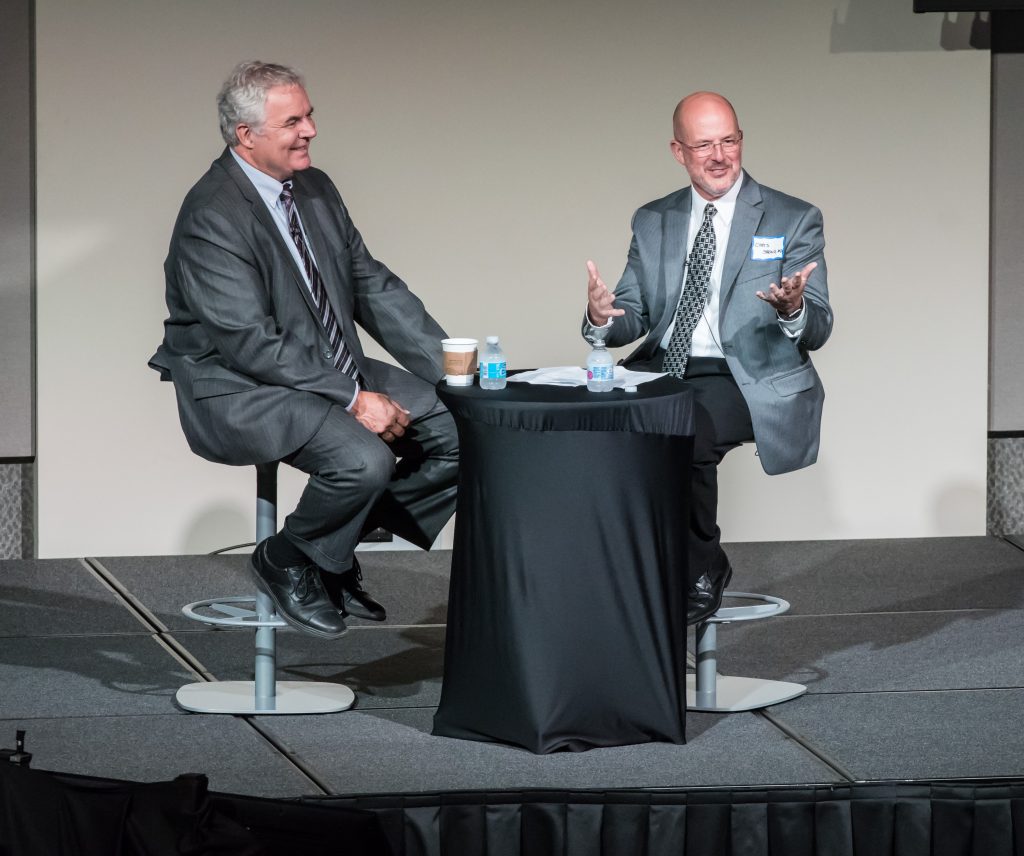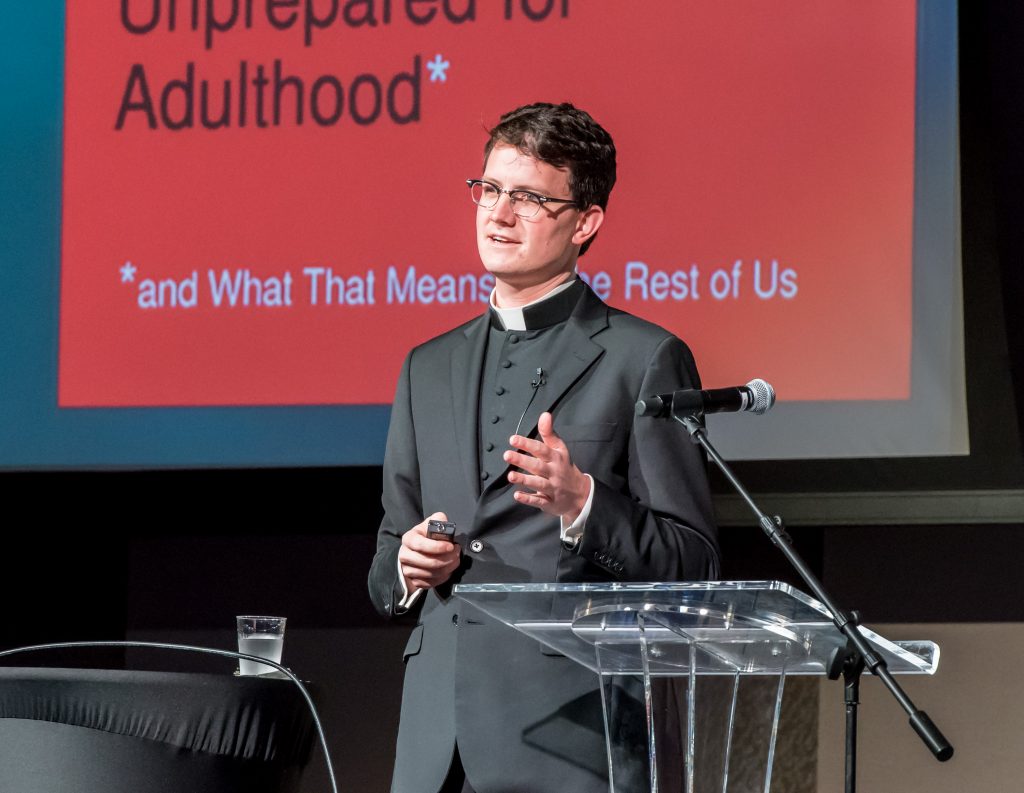October 19, 2017 // Special
MedCon: managing life concerns with a biblical perspective

Local medical professionals gather for a photo with Bishop Kevin C. Rhoades on the steps of the Cathedral of the Immaculate Conception in downtown Fort Wayne following the annual White Mass, which was the culmination of a conference for Catholic health care professionals on Oct. 14. Joe Romie
MedCon, the annual one-day, Fort Wayne-area conference on Catholicism and health care hosted by the Fort Wayne Jerome Lejeune Catholic Medical Guild, took place Oct. 14 at Parkview Mirro Center for Research and Innovation. The theme of this year’s conference was “Time for Change” and featured keynote speaker Marcus Grodi. Topics included Catholic ethics, beginning-of-life issues, end-of-life issues, job burnout and political issues related to health care.

Marcus Grodi, left, and Dr. Christopher Stroud present to local health care professionals and others the story of Stroud’s conversion to the Catholic faith, in a format similar to the television show “The Journey Home” on EWTN, which Grodi hosts. The talk was part of an Oct. 14 conference in Fort Wayne for medical, health care and other professionals. Joe Romie
Grodi hosts “The Journey Home,” a weekly live television program, and “Deep in Scripture,” a weekly live radio program, both on EWTN. He is the author of “Thoughts for the Journey Home,” “What Must I Do to be Saved?,” the novels “How Firm a Foundation” and “Pillar and Bulwark.” He also served as
both the editor and author of
“Journeys Home” and “Journeys Home II.” He spoke on his personal faith journey and used the Beatitudes in St. Matthew’s Gospel to broach the topic of continual conversion as a keynote presentation.

Father Royce Gregerson talks about transforming a culture of death into a culture of life at the one-day Catholic conference. Joe Romie
Through a Lutheran-flavored foundation, Grodi went to college and then worked as an engineer for six years. He attended seminary and become an evangelical protestant minister for 20 years, before being received into the Catholic Church in 1992. He believes, he said, that faith is a trajectory that begins with a nominal, childlike understanding and moves to an awakening in Christ and eventually an understanding of the fullness of Catholicism. He added that we experience continual conversion throughout life, and that that “Catholicism gives us boundaries within which we have great freedom to earn the status of ‘well done, my good and faithful servant.’”
The Beatitudes are also stepping stones, or a staircase, to conversion. St. Gregory of Nyssa (A.D. 335-386) said, “When one climbs up by a ladder, he sets foot on the first step, and from there he goes on to the one above. Again, the second step carries the climber up to the third, and this to the following, and hence to the next. Thus, the person that always goes up ascends from where he is to the step above, until he reaches the top of his ascent. Now, why do I begin like this? It seems to me that the Beatitudes are arranged in order like so many steps, so as to facilitate the ascent from one to the other. For if man’s mind is ascended to the first Beatitude, he will accept what follows as a necessary result of thought, even though the next clause seems to say something new beyond what had been said in the first.” Grodi then provided an explanation of the meaning of each Beatitude, what the reward was for obedience to the Beatitude and what the crisis was for choosing not to adhere to it.
Several in attendance remarked that Grodi’s explanation was like “a mini-catechism class.” An individual in another group of medical personnel said, “He explained what I never took time to learn for myself, but always wanted to know.” Grodi concluded his keynote with prayerful steps to reconciliation, which included showing gratitude for the gifts God has provided, as well as remorse, humility and love; relinquishing the right to justice; desiring purity of heart; accepting whatever rejection may come as a result of your actions and accepting, without retaliation, ridicule for your faith in Christ.
After Grodi’s presentation, Father Royce Gregerson, chaplain for the Fort Wayne Jerome Lejeune Catholic Medical Guild, took the stage to speak to attendees about transforming a culture of death into a culture of life. He described the following challenges to a robust culture of life: threats to the family as the cornerstone of society, threats to the dignity of the elderly, the unborn, a child-friendly society and an authentically human approach to sexuality; and the challenges and opportunities for today’s youth. He suggested always looking at a person within the context of a family, because the authentic good of any individual person is tied to the good of their family whereas medicine, civil society and even pastoral care can tend to work on an individualistic level. He encouraged caring for the elderly in ways that recognize their membership in a family, by making younger family members responsible for the care of their elders. He said technology has also played havoc on the family unit as manifested in cyberbullying, the loss of an authentically human approach to sexuality, lack of sleep, loss of face-to-face interaction and a decline in participation in physical activities. Father Gregerson said there are opportunities for improvement, though, through inoculating them from such dangers by having serious conversations with young people and practicing “great adherence to new progressive orthodoxies about sexuality and the meaning of life.”
The afternoon sessions began with a mock “Journey Home” session between Grodi and Christopher Stroud, M.D., about Dr. Stroud’s journey and conversion from a child of poverty, and the mentors who guided him through his years as a doubting Thomas to who he is today, a Catholic who tries to incorporate his faith into his medical practice every day. Stroud spoke to the faithfulness of his wife to stand by him in his spiritual journey, which led him from prescribing artificial contraception to use of Creighton Model FertilityCare System / NaProTechnology.
There were other breakout sessions throughout the day for attendees to learn about politics, relaxation and end-of-life decisions. During breaks between sessions, attendees visited vendors to purchase books, discuss life insurance and pick up prayer cards. The day concluded with a White Mass celebrated by Bishop Kevin C. Rhoades at the Cathedral of the Immaculate Conception.
Lectors and gift bearers who were physicians exercised their ministries at the Mass. Alluding to them and to the other health care workers who were present, Bishop Rhoades said in his homily, “Their profession is a vocation, a special calling. It is a witness to Christ the physician, who, as we see in the Gospels, went about doing good and healing the sick, who showed great love for the sick and the suffering.
“You who serve in health care are called to be the living image of Christ and of his church in serving the sick and the suffering. This, of course, includes your fidelity to the teachings of the church on the life and dignity of the human person. As St. John Paul II taught: ‘Your profession calls you to be guardians and servants of human life.’ Yours is a lofty calling, to serve as ministers of life, to witness to Christ in your healing profession. We thank you for your witness, for the long hours you work in caring for the sick and the dying, and for the sacrifices you make in doing so. Yours is a vocation of love. You are instruments of God’s compassion and love for the sick and suffering. We pray that the Lord will bless you in your noble vocation, a path of holiness for you, a way to love Christ in the person of the sick and the suffering.”
The best news. Delivered to your inbox.
Subscribe to our mailing list today.






